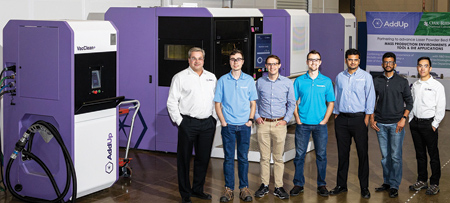
Members of the Oak Ridge National Laboratories and AddUp team collaborate to target the advancement of materials processes for metal AM tooling applications.
A $2.7 million cooperative research and development agreement (CRADA) between AddUp Group, a global machine and solutions provider for metal additive manufacturing (AM), and the U.S. Department of Energy's (DOE) Oak Ridge National Laboratory (ORNL) aims to advance laser powder bed fusion (LPBF) technology for the manufacturing of metal molds with complex geometries for the tooling industry.
"AddUp provides a unique industrial approach to metal 3D printing that is fortified by the inherited expertise of its two founders, Fives and Michelin," said a spokesperson. "The AddUp Group, with health, safety and the environment at the core of its concerns, offers multiple integrated technologies, capabilities and comprehensive solutions, including: machines and systems; training and consulting; design for AM; and proof of concept. These precision systems are highly productive, capable of fine-resolution printing and are paired with the flexibility of an open architecture framework for materials and parameters."
AddUp's involvement at DOE's Manufacturing Demonstration Facility (MDF) at ORNL centers on the development of industrial LPBF technology, with a specific focus on the advancement of metal AM applications for tooling. Through improving the deposition rate within powder bed technologies, closely controlling the metallurgical processes and managing the qualification of steel tooling components, this project is expected to advance metal 3D printing overall.
"ORNL contributes an in-depth understanding of material properties and process parameters that leverages in-situ data analytics and advanced machine learning tools," said the spokesperson. "Using the cutting-edge methods of characterization present at the MDF, the CRADA will also expedite the delivery of validated AM process recipes and a deepened comprehension of the microstructural properties of AM tool steels. The pooled expertise from both AddUp and ORNL enables a robust approach to fabricate complex mold and die tooling that will lead to reduced cycle time and optimized, repeatable performances."
The CRADA focuses on the development of breakthrough solutions for the geometric constraints and limitations (e.g., overhang angles, thin walls, process repeatability) that impede metal AM from becoming a widely adopted method of manufacturing for tooling and mass production environments. For example, many challenges are present in the plastic injection molding industry that can be overcome by using complex cooling channels.
AddUp and ORNL will explore the impact of these complex channels to advance applications. "Subtractive, conventional methods that use traditional machinery hinder the design freedom of intricate channels within the mold," said the spokesperson. "This collaborative effort aims to deliver a technology capable of improving pre-existing processes of manufacturing conformally cooled molds with optimized mechanical properties, productivity and quality for enhanced performance in-high volume production environments."
For more information contact:
AddUp
contact@addupsolutions.com
www.addupsolutions.com/en/
Oak Ridge National Laboratory
P.O. Box 2008
Oak Ridge, TN 37831
865-576-7658
www.ornl.gov